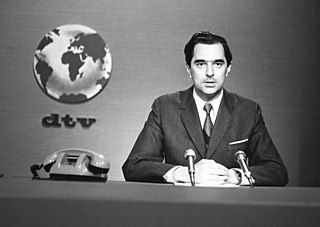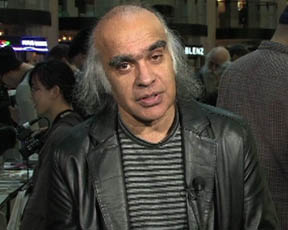Related Research Articles

Propaganda is communication that is primarily used to influence or persuade an audience to further an agenda, which may not be objective and may be selectively presenting facts to encourage a particular synthesis or perception, or using loaded language to produce an emotional rather than a rational response to the information that is being presented. Propaganda can be found in a wide variety of different contexts.

A propaganda film is a film that involves some form of propaganda. Propaganda films spread and promote certain ideas that are usually religious, political, or cultural in nature. A propaganda film is made with the intent that the viewer will adopt the position promoted by the propagator and eventually take action towards making those ideas widely accepted. Propaganda films are popular mediums of propaganda due to their ability to easily reach a large audience in a short amount of time. They are also able to come in a variety of film types such as documentary, non-fiction, and newsreel, making it even easier to provide subjective content that may be deliberately misleading.

Media manipulation is a series of related techniques in which partisans create an image or argument that favors their particular interests. Such tactics may include the use of logical fallacies, manipulation, outright deception (disinformation), rhetorical and propaganda techniques, and often involve the suppression of information or points of view by crowding them out, by inducing other people or groups of people to stop listening to certain arguments, or by simply diverting attention elsewhere. In Propaganda: The Formation of Men's Attitudes, Jacques Ellul writes that public opinion can only express itself through channels which are provided by the mass media of communication – without which there could be no propaganda. It is used within public relations, propaganda, marketing, etc. While the objective for each context is quite different, the broad techniques are often similar.
The following outline is provided as an overview of and topical guide to public relations:
Quentin Robert Duthie Skinner is a British intellectual historian. He is regarded as one of the founders of the Cambridge School of the history of political thought. He has won numerous prizes for his work, including the Wolfson History Prize in 1979 and the Balzan Prize in 2006. Between 1996 and 2008 he was Regius Professor of History at the University of Cambridge. He is the Emeritus Professor of the Humanities and Co-director of The Centre for the Study of the History of Political Thought at Queen Mary University of London.

Bedford College was founded in London in 1849 as the first higher education college for women in the United Kingdom. In 1900, it became a constituent of the University of London. Having played a leading role in the advancement of women in higher education and public life in general, it became fully coeducational in the 1960s. In 1985, Bedford College merged with Royal Holloway College, another constituent of the University of London, to form Royal Holloway and Bedford New College. This remains the official name, but it is commonly called Royal Holloway, University of London (RHUL).
John Louis Beddington (1893–1959) was a United Kingdom advertising executive, best known for his work as publicity director for Shell in the 1930s and as head of the Ministry of Information Films Division during World War II.
Nicholas J. Cull is a historian and professor in the Master's in Public Diplomacy program at the Annenberg School for Communication and Journalism at the University of Southern California. He was the founding director of this program and ran it from 2005 to 2019.

Sut Jhally is a professor of communication at the University of Massachusetts Amherst, whose work focuses on cultural studies, advertising, media, and consumption. He is the producer of over 40 documentaries on media literacy topics and the founder and executive director of the Media Education Foundation.
Paul Baines is a British marketing academic, specialising in the topic of marketing for political parties and candidates. He is the professor in Political Marketing at Cranfield University. He was the former Director of Business Development at the Middlesex University Business School and the former the Director for the Baines Associates Limited, since 2008. In 2019 he joined the University of Leicester as Professor of Political Marketing and Associate Dean.
Michael Burleigh is an English author and historian whose primary focus is on Nazi Germany and related subjects. He has also been active in bringing history to television.
Colin Anfield Hughes was a distinguished British-Australian academic specialising in electoral politics and government. He was Emeritus professor of political science at the University of Queensland, and chairman of the Queensland Constitutional Review Commission (1999–2000).

Michael Arthur Nathan Loewe is a British sinologist, historian, and writer who has authored dozens of books, articles, and other publications in the fields of Classical Chinese as well as the history of ancient and early Imperial China.

Dan Caspi was a lecturer at the Communication Studies Department of Ben-Gurion University of the Negev, Beersheba, Israel.
Steven Casey is a professor of international history at the London School of Economics. He is an expert on 20th-century American history and foreign policy.

Andrew Jackson O'Shaughnessy FRHS is an academic historian and professor of history at the University of Virginia. Between 2003 and 2022, he was Vice President of the Thomas Jefferson Foundation and the Saunders Director of the Robert H. Smith International Center for Jefferson Studies at Monticello.
John O'Shaughnessy was a British academic and business writer.
Since the end of the 20th century, propaganda has evolved significantly. In the 21st century, propaganda is largely disseminated through the news, internet and on social media platforms such as Twitter. Modern propaganda still utilises classic tactics such as name-calling and bandwagoning in order to sway the audience toward or against a particular belief. Pieces of "traditional" propaganda are typically created and distributed by larger entities or organisations, while modern propaganda can be created and spread by vast numbers of individuals simultaneously online. Modern propaganda can take many forms, ranging from memes to mainstream partisan news.
Bruce Lannes Smith was an American political scientist, communication theorist, and propaganda specialist. His primary research focus was the various uses and techniques of propaganda and persuasion employed by governments that were considered enemies of the United States. He taught at Michigan State College and other institutions. After the Second World War he was involved with research on propaganda and mass persuasion on a mass audience while also questioning the methods used by the Nazi propaganda theorist Franz Six.
References
- 1 2 3 "Professor Nicholas O'Shaughnessy Professor of Communication". Queen Mary University London. Retrieved 18 January 2013.
- ↑ "The Fellowship Professor Nicholas J O'Shaughnessy". Hughes College, Cambridge. Archived from the original on 7 October 2014. Retrieved 18 January 2013.
- ↑ Harris, P (June 2007). "Book Review: Politics and Propaganda: Weapons of Mass Seduction". Journal of Macromarketing. 27 (2): 199–201. doi:10.1177/0276146707301786. S2CID 153985627.
- ↑ Richards, Barry (2008). "A Review of: "Politics and Propaganda. Weapons of Mass Seduction. Nicholas Jackson O'Shaughnessy"". Journal of Political Marketing. 7 (1): 92–95. doi:10.1080/15377850802064163. S2CID 145432036.